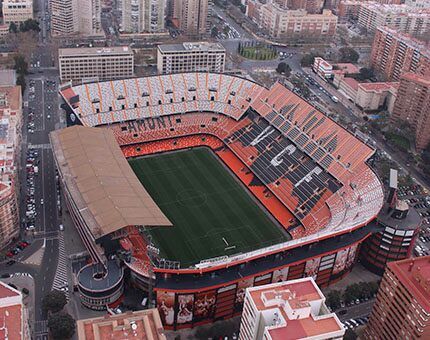When La Liga kicked off its inaugural season in 1929, it was Barcelona that triumphed, securing the first league title, with their fierce rivals, Real Madrid, finishing as runners-up. From that moment on, these two giants of Spanish football have been at the heart of La Liga’s narrative, dominating the competition. Together, Barcelona and Real Madrid have amassed an astonishing 63 league titles, solidifying their places as the primary protagonists in Spain’s footballing story.
However, while Barcelona and Real Madrid’s rivalry often steals the spotlight, it is essential to remember that other clubs have also achieved significant success in Spain. Athletic Bilbao, Atlético Madrid, Valencia, and others have contributed to the rich tapestry of Spanish football. Each of these clubs has its own distinct history, with moments of glory that have shaped Spanish football for generations.
Valencia CF: A Story of Glory and Resilience
Valencia CF, with their six La Liga titles, have had their share of triumphs, though their journey to success has often been marked by sporadic brilliance. One of their most unexpected league triumphs came in 1971, when everything seemed to align perfectly for the team. However, the Valencia team of the late 1970s and early 1980s arguably offered even more quality, with players like Kurt Jura orchestrating the midfield and Johnny Rep alongside Mario Kempes causing havoc up front.
Beyond their individual brilliance, Valencia were also successful on the continental stage, securing the European Cup Winners’ Cup in 1980. This period remains one of the most thrilling in the club’s history. Yet, for those looking at sustained success, two distinct eras stand out. The first was in the 1940s when Valencia were an unstoppable force. They clinched three league titles and two Copa del Rey victories, largely thanks to prolific goal-scorers like Silvestre Igoa and the legendary ‘Mundo’ Trabanco, who netted an incredible 186 goals for the club.
The second period of sustained excellence came in the early 2000s when the dominance of Barcelona and Real Madrid was seriously challenged. During this time, Valencia won two La Liga titles and managed to finish as runners-up in the Champions League, proving that they were more than just a fleeting success story in Spanish football.
Athletic Bilbao: The Basque Powerhouse
Athletic Bilbao’s history in Spanish football is as rich and unique as the Basque Country itself. The club’s philosophy of only recruiting players from the Basque region has made them a symbol of regional pride and identity. Los Leones (The Lions) enjoyed their most significant success in the 1930s, securing four La Liga titles during that decade. However, their roots trace back even further, with Athletic Bilbao winning the Copa del Rey as early as 1903.
In the years that followed, the club faced ups and downs, but they were always a formidable force. The 1950s marked a revival for the club, and the 1980s would be another golden era for the team. A powerful squad, featuring the likes of Andoni Zubizarreta in goal, Andoni Goikoetxea—famously known as ‘The Butcher’—and Manuel Sarabia in attack, helped Athletic Bilbao dominate Spanish football for a brief period. This team was exceptional, twice denying both Real Madrid and Barcelona the league title, making them a formidable force during the 1980s.
Atletico Madrid: The Unyielding Mattress Makers
Atletico Madrid have long been the club that refused to be overshadowed by Barcelona and Real Madrid. Known as “Los Colchoneros” (The Mattress Makers), their nickname comes from their early years when they wore red-and-white striped kits made from fabric remnants from a local mattress factory. Though their journey to the top was not as immediate as that of Barcelona or Real Madrid, Atletico have consistently been one of Spain’s top teams.
Their first major success came in the 1950s, a decade during which they enjoyed a golden period, winning multiple league titles. Under the guidance of legendary coach Helenio Herrera, Atletico Madrid established themselves as a dominant force in Spanish football. The club then went on to achieve sustained success through the 1960s and 1970s, winning four league titles and reaching a European Cup final. Atletico Madrid’s resilience has been their trademark, and even when they have been overshadowed by Barcelona or Real Madrid, they have remained competitive at the highest level.
Fast forward to the 21st century, and Atletico Madrid’s fortunes reached new heights under manager Diego Simeone. Simeone’s intense and disciplined approach led Atletico to multiple titles, including La Liga triumphs and two Champions League final appearances. His tenure has been transformative, ensuring that Atletico remain firmly in contention for both domestic and European honors.
FC Barcelona: The Catalan Giants
FC Barcelona is synonymous with some of the greatest moments in modern football history. With their commitment to possession-based football and their world-renowned La Masia academy, Barcelona has cultivated a style of play admired worldwide. Barcelona’s identity is deeply rooted in Catalan pride and the club’s famous motto, “Més que un club” (More than a club), speaks to its importance both as a sporting entity and as a symbol of regional and cultural identity.
Barcelona’s story has been intertwined with legends of the game, from Johan Cruyff’s introduction of Total Football in the 1970s to the reign of Lionel Messi, widely regarded as one of the greatest players of all time. The club has won 26 La Liga titles, more than any team apart from Real Madrid, and their success extends beyond Spain. Barcelona’s five UEFA Champions League titles are a testament to their status as one of Europe’s elite clubs. In recent decades, they have dominated both Spanish and European football, with the golden era of 2009-2015 under Pep Guardiola being one of the most successful and innovative periods in the club’s history.
However, despite the club’s historical success, Barcelona has faced challenges in recent times, with financial issues affecting their ability to compete at the top level. Nonetheless, given their history, tradition, and ongoing talent development, Barcelona remains one of the most formidable clubs in world football.
Real Madrid: The Royal Club
Real Madrid is not just the most successful football club in Spain but also one of the most successful clubs in world football. Founded in 1902 as Madrid FC, Real Madrid has grown into a global footballing institution. With a rich history steeped in both domestic and international success, Real Madrid has won 35 La Liga titles—more than any other club—and their dominance in European competitions is unparalleled, with 14 UEFA Champions League titles to their name.
Real Madrid’s history is intrinsically linked to Spain’s royal family, as evidenced by the club’s official title, “Real,” meaning “Royal.” This association with Spanish royalty, along with their longstanding political connections, has fueled both admiration and controversy. Real Madrid’s status as the club of the establishment has earned them passionate supporters, as well as staunch detractors, but their record speaks for itself.
The club has been home to many of the greatest players in football history, including Alfredo Di Stefano, Zinedine Zidane, and Cristiano Ronaldo, all of whom have helped Real Madrid establish a winning culture that has stood the test of time. Real Madrid’s unmatched success in the Champions League, with 14 titles, is a testament to their position as the most successful European club of all time. For many, Real Madrid’s ability to continually attract world-class talent and maintain their dominance in European football is a source of awe.















